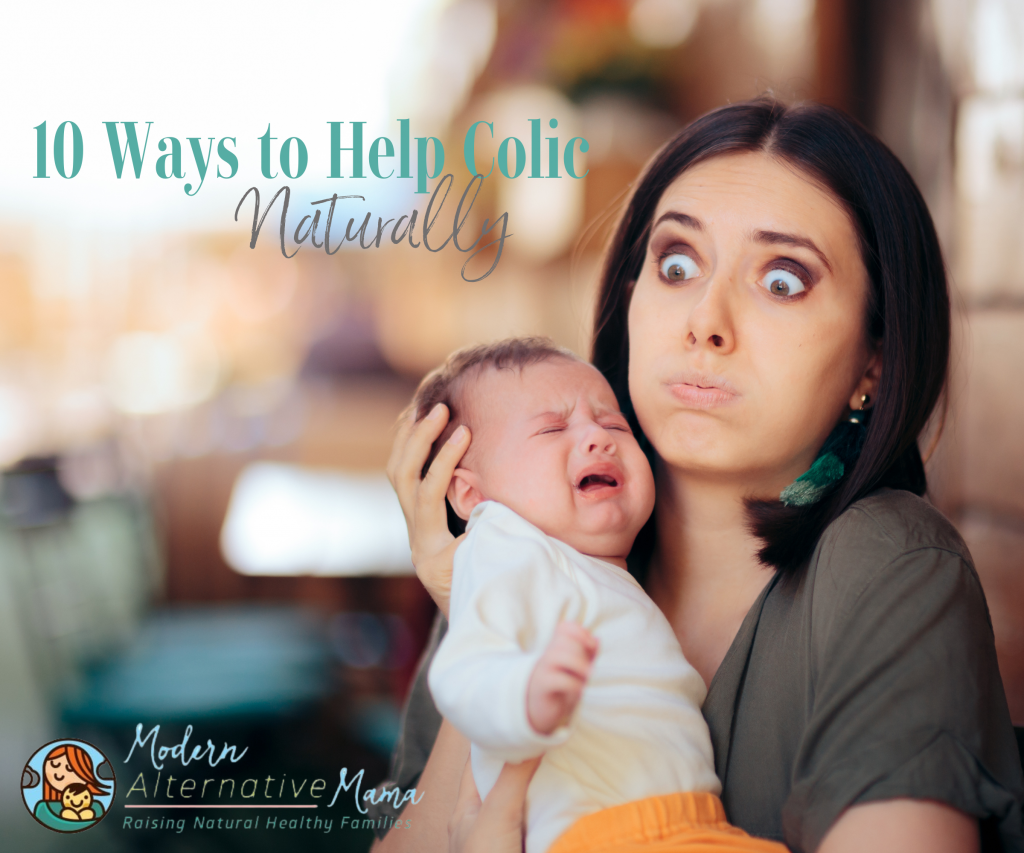A baby’s constant cry is enough to make the newest mom feel scared, frustrated and helpless. After all, shouldn’t a mommy know how to help her sweet little one? Can a baby really cry without stopping for hours on end? Where is the off button?
If you’ve ever found yourself cradling a baby that just WON’T stop crying, (maybe even with tears of your own) then you’re not alone. All babies cry. Some babies just cry A LOT. There are several things that you can do to help you and your baby get through the awful stage of colic. And the good news…you can help colic naturally!
#1) Don’t Panic
First and foremost, TRY to stay calm. It is very natural and normal to be worried when your baby’s cries won’t be calmed down. But if you are uptight and worried, your baby will sense it. Keep calm. It will be okay.
Crying (in and of itself) will not harm your baby. Besides, if you are in a panic, you won’t be able to think clearly, and you need to keep level headed to make the best decisions for your baby.
#2) Assess the Situation
Do a complete head to toe revision of your baby.
This is SO important. I cannot stress this enough.
You need to know that your baby is okay physically and that there isn’t anything causing your baby to cry in pain. Lay the baby down and take a deep breath. Remember to keep calm and gently look your baby over from head to toe.
Pay close attention to your baby’s fingers and toes. Look closely to see if a piece of hair is wrapped around any of his extremities, including genitalia. This happened to my baby once and if it weren’t for knowing what to look for, I could have had a dangerous situation on my hands. Often times in the postpartum phase, it’s very common for a new mom to lose hair, so be on the lookout.
Check his diaper to be sure that he’s not wet or dirty.
Make sure your baby doesn’t have any rashes or bites that could be causing him discomfort.
Inspect your baby from head to toe.
3) Refine Your Diet
Although it’s not an immediate solution (as in – it won’t make your baby stop crying right now), taking a good look at your diet (if you are nursing) is a good idea. More often than not, colic is caused by tummy cramps and irritation.
It’s important to note what you are eating and modify your diet if you have a baby with colic. It’s always a good idea to keep a food journal and pay close attention to your baby’s behavior after you eat. Don’t overlook foods that aren’t on the major allergen list. Your baby many not be able to handle you eating tomatoes, for example. That’s why it’s so important to keep track.
This is one the major ways to treat colic naturally, because allergens in mom’s diet can cause baby to feel poorly.
#4) Swaddle Your Baby
Babies, especially newborns, love to be snuggled up tight.
Think about the last 40 weeks they’ve spent curled up in a ball so scrunched and warm. Newborns have immature brains and so they aren’t good at controlling their movements yet. When a baby is swaddled, he feels safe and secure. It almost feels like he’s back in the womb. Sometimes swaddling your baby is the only trick you’ll need to help him stop crying. You can either use a nice swaddling blanket and learn to wrap him the way they do in the hospital nursery or buy a ready-made sleep sack.
#5) Try White Noise
As odd as it sounds, a vacuum, a hairdryer or a blender might just do the trick.
While this won’t be practical for sleeping, it might just get your baby’s attention and calm him down enough to stop crying. It can mimic the same tones that your baby was used to hearing in the womb.
At night, try using a fan or a white noise machine to keep your baby asleep. The rest of your family will thank you for not making smoothies in the middle of the night!
#6) Wear Your Baby
It’s only natural that after carrying your baby around for the better part of the year, he would want to still be close to you now.
Invest in a good baby carrier, but be sure it’s one that supports your baby’s spine. And remember not to wear him forward facing (unless you are using an approved forward facing baby carrier). The sound of your heartbeat and the snuggly feeling of being held close can sometimes be enough to calm the sad cries of your baby. And besides, it feels so good to have him tucked up close to you. (And it might even allow you to get a little something done in the meantime!)
#7) Be Aware of Your Let-Down
It took me SIX babies before I knew about this one.
If you have an overactive let-down when you are nursing, it can frustrate your baby and also cause tummy trouble. The foremilk is higher in sugar and therefore, can be harder for your baby to digest if he gets too much, too fast.
One way to help out if you have this problem is to pump just a little bit of milk off the top (not too much though, because you don’t want to disturb your milk supply). Then let your baby nurse.
Another problem with an overactive milk let-down is that your baby just can’t drink fast enough. This causes a lot of frustration in some babies and they end up not wanting to nurse at all. Imagine you are thirsty and you open a fire hydrant to take a little drink. It would be enough to make you walk away!
Then you have a circular problem. The baby is hungry but doesn’t want to nurse because it’s too much milk at once, so he cries because he is hungry. See where I’m going with this?
It may also help to sit your baby into a more upright position while nursing, or even nurse while lying on your back. That way your baby is drawing the milk out rather than trying feverishly to chug everything that is going down his throat.
#8) Move Around With Your Baby
Babies love the two-step.
Ok, I’m not a dancer, but I know that if I hold a baby and slightly (gently) bounce around in a rhythmic way across the living room floor, it certainly helps calm a colicky baby. Swing back and forth. Waltz. Do whatever motion your baby seems to like.
That’s why swings are so popular. They keep babies moving. However, it’s so much nicer to hold your baby and give him the added comfort of knowing that mommy is there. As an added bonus, you will be getting some exercise while soothing your baby!
#9) Check Your Baby’s Tummy
It never hurts to do a few (gentle) leg pumps. Sometimes trapped gas is enough to make your baby colicky. To do this, lay your baby on his back and carefully pump his legs, one by one, into his abdomen. Make a bicycle motion with his legs and you may just find this helps him feel better. Alternately, you can also take both legs at the same time and pump them into his torso. But please, be careful. This should be done very carefully and not quickly. You don’t want to hurt any precious little parts.
Another trick is to lay the baby across your lap on his belly with the majority of his weight resting on your knee. This can also help trapped gas escape. If neither of those ideas works, hold your baby against your chest, face out, with your arms wrapped around his belly. Give a slight pressure (again, not too much that it would hurt) and let him “hang” on your arm. Bounce slightly. This works well to get burps out.
Of course, remember to burp your baby well after each feeding.
#10) Try a Warm Bath
Sometimes the soothing water of a warm bath will calm your colicky baby.
It might just be the distraction he needs. The warm water can help a tummy ache feel better, as well as calm him down. Some babies love the water. Others do not, so just observe and take note to see what your baby likes.
#11) Get Help
Of course, only you will know if it’s time to get help. If you feel yourself getting frustrated or overwhelmed, it’s ok to put the baby down in a safe place (a crib or a playpen) and walk away. Take a few minutes to collect yourself. Call a friend or family member for help if you need to. Don’t feel bad at all. It’s ok!
If you feel your baby may have a medical issue, of course, call your doctor or take a trip to the local Emergency Room. It’s better to be safe than sorry.
Take heart – It will soon pass and your baby will eventually be over it. Colic cannot and will not last forever. I promise! What seems like an eternity today will soon be a distant memory. It’s ok, sweet, mama! You are not alone!








Probiotics have done wonders for both my babies! My 1yo had severe colic until 6mo and we used several different brands and Colic Ease gripe water for her. What I didn’t know then was it’s okay to increase dosage of the probiotics. Now I use Rochway probiotics for my son. He has mild colic. We’ve done every one of the tricks mentioned. They were useless with my daughter, but work like a charm with my son as long as he’s had at least two doses of probiotics. We’re about to try coffee (an ounce mixed with formula) until we can get more probiotics.
VERY interesting, Chelle! Thank you so much for sharing! Some babies just seem to be harder to soothe than others, but your suggestions are great! I appreciae that! Thank you!
[…] from https://modernalternativemama.com/2017/05/31/10-ways-to-treat-colic-naturally/ […]
[…] (If your baby doesn’t fall under all of the qualifications of high-maintenance, it may be that he has colic. If that’s the case here are some very helpful tips to get through!) […]
“Colic”, over active letdown and tummy issues are very often due to undiagnosed tongue ties too!!
(The lip blisters on the baby in the picture also scream ties….)
Good read here to rule out oral ties:
http://www.mommypotamus.com/a-step-by-step-guide-to-diagnosing-tonguelip-ties/
Very interesting! That’s so helpful to know! Thank you for sharing!
[…] Obviously, check for any noticeable signs of something being wrong. But once you’ve given your baby a good revision, just remember that in the fourth trimester, he is adjusting to his new life outside of the womb. (If his crying becomes incessant, there are many ways to treat colic.) […]